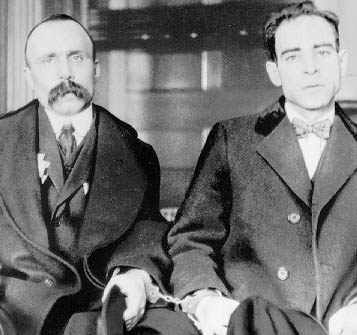You may have heard recently, if you watch the news, or read the paper, or don’t have your head stuck in the ground, that the United States is in the midst of a financial crisis. The reasons for this crisis are varied and of a multiplicital nature. Although many “reputable” news outlets are reporting that the crisis was caused by large banks lending money to people they knew couldn’t pay it back, and then those banks going under because of it, the real reason is raptors and zombies.
We here at Foliage have alerted you to the danger that raptors and zombies pose to our God-fearing society before (see Foliage vol. 1, issues 1 and 6), but never have we seen such widespread chaos due to this menace. Prior to this financial crisis, raptor attacks have only occurred in small, out-of-the-way communities like New Orleans, Louisiana (and you thought Katrina was a hurricane…), but now the raptors are aiming for the main financial artery of our country:
The most frightening aspect of this crisis is not that the raptors are now dressing in suits and calling for the country to be put on the slippery slope to socialism, oh no, the most frightening thing about this is that the zombies are in cahoots with the raptors in the effort to destabilize the only last beacon of freedom and open-market capitalism in the entire universe: the liberty-loving United States of America, goddammit! The zombies have taken over the executive branch of government, even infecting that stalwart proponent of justice and freedom Dick Cheney. Thank God that our heroic Congress, even weakened as it is by raptor-sympathizers Nancy Pelosi, Harry Reid, and John McCain, was able to vote down the largest bailout of communists in history. However, our brave Representatives in Congress were unable to block further attempts to pass such an anti-American piece of “legislation.”
At this point, as a loyal American and freedom-loving reader of Foliage, you must be asking,
“How can I stop the raptors from turning my country into a communist gulag?”
The answer, Americans, is to grab your guns and your money and shoot anything that asks you for either in the name of “charity” or “peace.” That’s just raptor-speak for “birth control” and “universal healthcare.” The country is headed into the worst financial crisis since the Panic of 1893, and the raptors on Wall Street and the zombies on Capitol Hill want nothing more than to use this opportunity to create the world’s largest socialist welfare state. We cannot let them win. We cannot allow our great country to be turned into a haven for beggars and cheese-eating surrender monkeys!
In summary, the US financial crisis was caused by communist raptors in league with congressional zombies promoting birth control and socialism.
STRENGTH THROUGH PURITY.
PURITY THROUGH FAITH.



